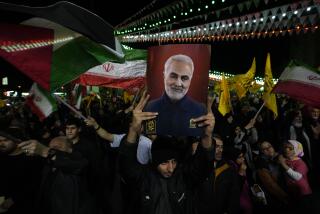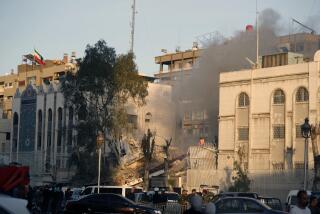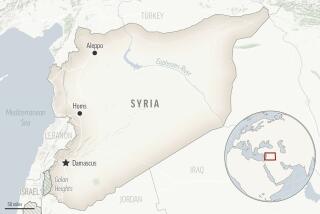Syria regime launches new attacks on Hama, other restive cities
The human toll and diplomatic fallout of the Syrian government’s pre-Ramadan crackdown against opposition protesters continued to rise Monday as security forces launched new attacks in the cities of Hama, Dair Alzour and Bukamal and foreign governments announced added sanctions.
At least three people were killed in Hama and one each in Bukamal and Dair Alzour, increasing the nationwide death toll to at least 75 in two days, according to the Local Coordination Committees, a prominent Syrian activist network that compiles the names of the dead. Another activist network, the Syrian Revolution Coordinators Union, put the death toll at about 150 nationwide, with 100 in Hama alone.
The violence spurred harsh international condemnation of President Bashar Assad on the eve of Ramadan, the Islamic holy month of fasting and contemplation. The timing of the attack by a government dominated by Assad’s fellow Alawite Muslims, who tend to be secular, seemed sure to provoke sectarian passions among Syria’s pious Sunnis.
The European Union expanded sanctions against Assad and his inner circle, imposing asset freezes and travel bans on five additional regime figures. “We are deeply appalled and dismayed by the operations in Hama and other Syrian cities,” said Ahmet Davutoglu, foreign minister of neighboring Turkey, once a steadfast Assad ally. “The method and timing of these operations is very wrong.”
In Washington, Secretary of State Hillary Rodham Clinton condemned the violence, and appealed to members of the United Nations Security Council who have resisted efforts to adopt a resolution denouncing the Assad regime for its crackdown.
The Russian Foreign Ministry issued a statement Monday condemning “the use of force against peaceful protesters” and urging restraint. The statement marks a possible turning point in the Russian stance on the situation in Syria. Previously, Moscow remained largely uncritical of the government crackdown, often acting as a counterweight to American and European efforts to act against Assad’s regime in the Security Council, which is set to possibly meet within days to discuss the issue.
Syrian authorities continued to insist, through strictly controlled state media, that the violence was caused by unspecified armed groups attacking security forces and residents, a claim derided as fictional by most independent observers. Video posted to the Internet showed tanks at the outskirts of Hama launching shells at residential areas.
“Tanks rolled into Hamadiya [neighborhood] at 6 a.m. this morning as random gunfire echoed through the neighborhood,” said a Hama locksmith reached by phone, who spoke on condition of anonymity for fear of retribution against himself or his family.
“We have dead bodies in and around our homes because the security forces aren’t allowing us to bury them,” he said. “You can imagine how smelly and unhygienic everything is.”
According to the locksmith, army and security personnel restricted access to hospitals, forbidding the injured from receiving medical assistance.
“The situation in hospitals is bad,” said Mahmoud, a doctor in Hama’s Hourani Hospital reached by phone, who declined to give his last name. “There are many dead and wounded inside and we are suffering from an extreme shortage in hospital blood banks and medical supplies.”
A Hama university professor described the scene Monday as terrifying and chaotic, as neighborhood locals burned tires to prevent army tanks from entering residential areas.
“As heavy gunfire envelopes our town and security forces prevent us from leaving, there is really nothing to do but pray and protect our homes and our loved ones that are still alive,” said the professor, Hassan, who was reached by phone and asked that his last name not be published.
The accounts could not be independently verified because international journalists have not been allowed access to Syria.
The current crackdown in Hama has evoked memories of a 1982 massacre, when then-ruler Hafez Assad, the current president’s father, launched a bloody attack on Hama to quell protests, resulting in thousands of deaths.
“Now people don’t need to talk about 1982 anymore. They can talk about 2011,” said the locksmith.
Hajjar is a special correspondent. A special correspondent in Damascus contributed to this report.
More to Read
Start your day right
Sign up for Essential California for news, features and recommendations from the L.A. Times and beyond in your inbox six days a week.
You may occasionally receive promotional content from the Los Angeles Times.






